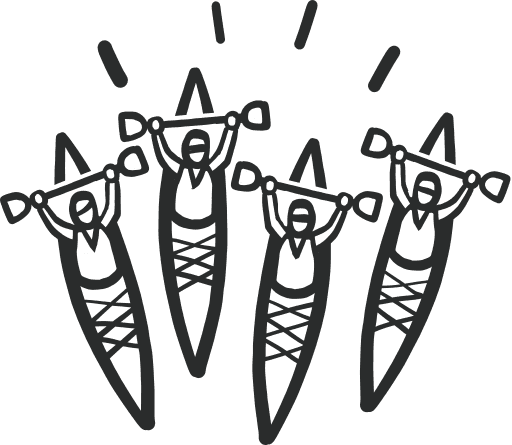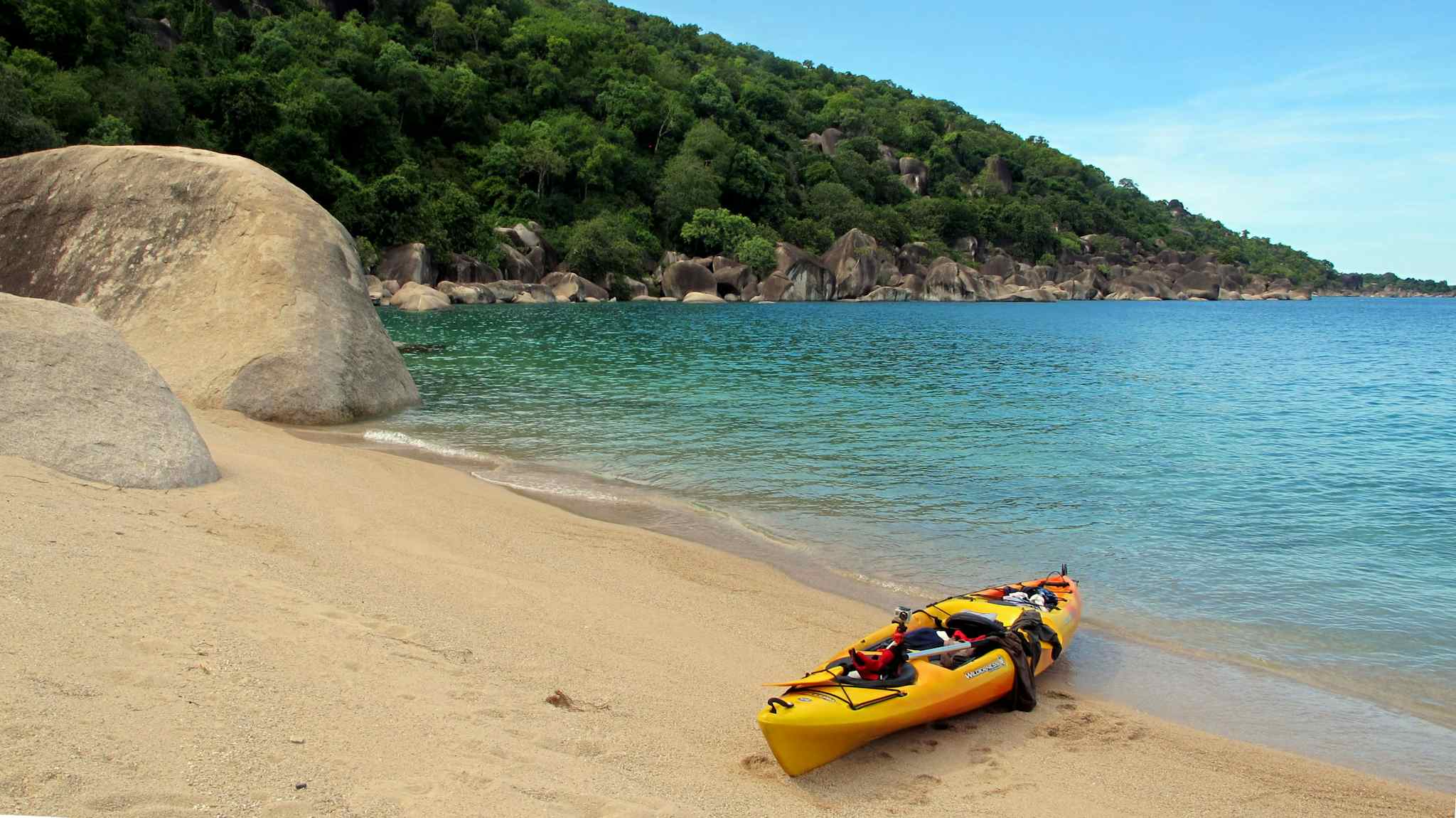
Kayaking Expedition to the Chimpanzee Forests of Tanzania
A journey like no other along the world's longest freshwater lake to reach the chimpanzees of the Mahale Mountains
What's Included?
Activities & Certified Guides
All itinerary activities with expert, expedition kayak guides, plus a park ranger in the Mahale Mountains NPAll accommodation
1 night in a hotel, 2 nights in a lakeside lodge, 7 nights wild campingMeals
8 breakfasts, 8 lunches, 8 dinnersTransfers
Airport transfers and everything in betweenEquipment & Permits
All your kayaking and camping gear, including Park and chimp trekking fees in MahaleSmall Like-minded Groups
Solo-friendly by design, join our small n’ sociable groups of up to 8 like-minded, active and outdoorsy people…
…
What's it like?

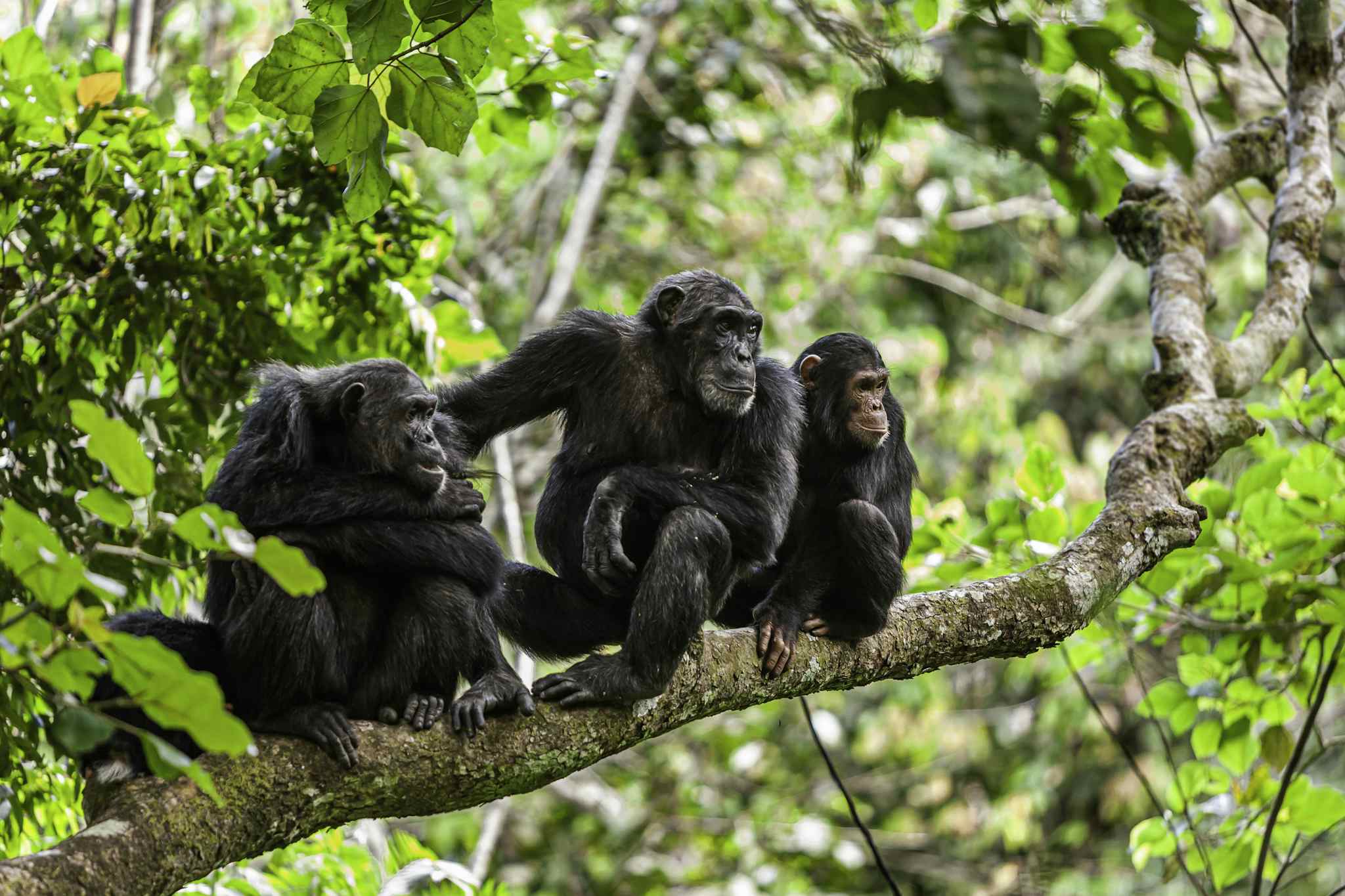



Paddle along the wild, remote shoreline of Lake Tanganyika – one of Africa’s Great Lakes and the world’s second-largest
Kayak the glistening waters, swimming and snorkelling as you go, tucking into freshly caught fish and wild camping on idyllic beaches
Venture into the densely forested Mahale Mountains National Park for ranger-guided hikes to see the protected chimpanzees
Key Information
Day 1
Welcome to Tanzania!
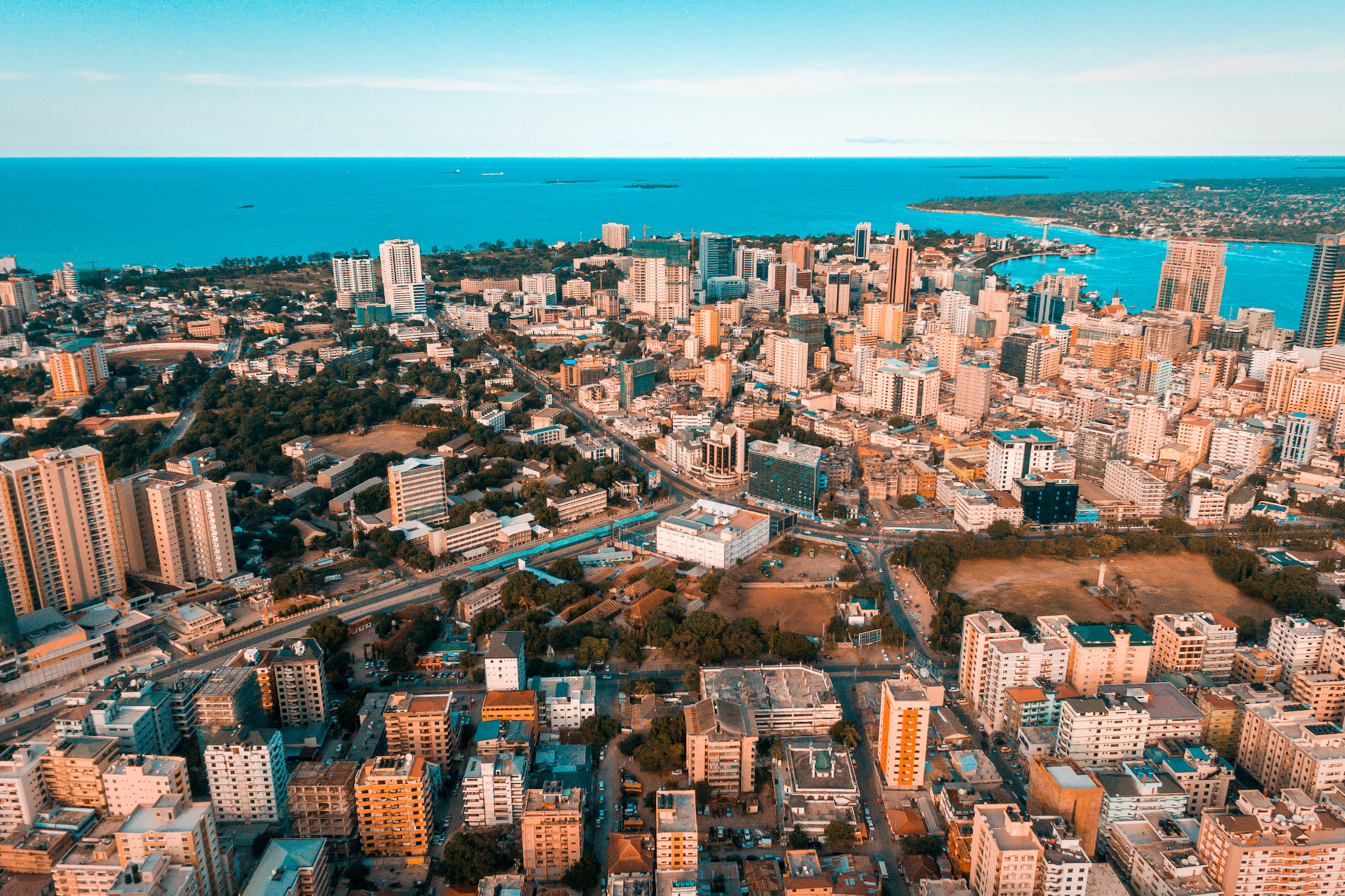
Touch down in Tanzania's capital, Dar Es Salaam, and get transferred to your hotel for the night. Depending on your arrival time you can explore the city before getting an early night – as you'll be on a very early flight with your fellow adventurers tomorrow morning.
Day 2
To the lake
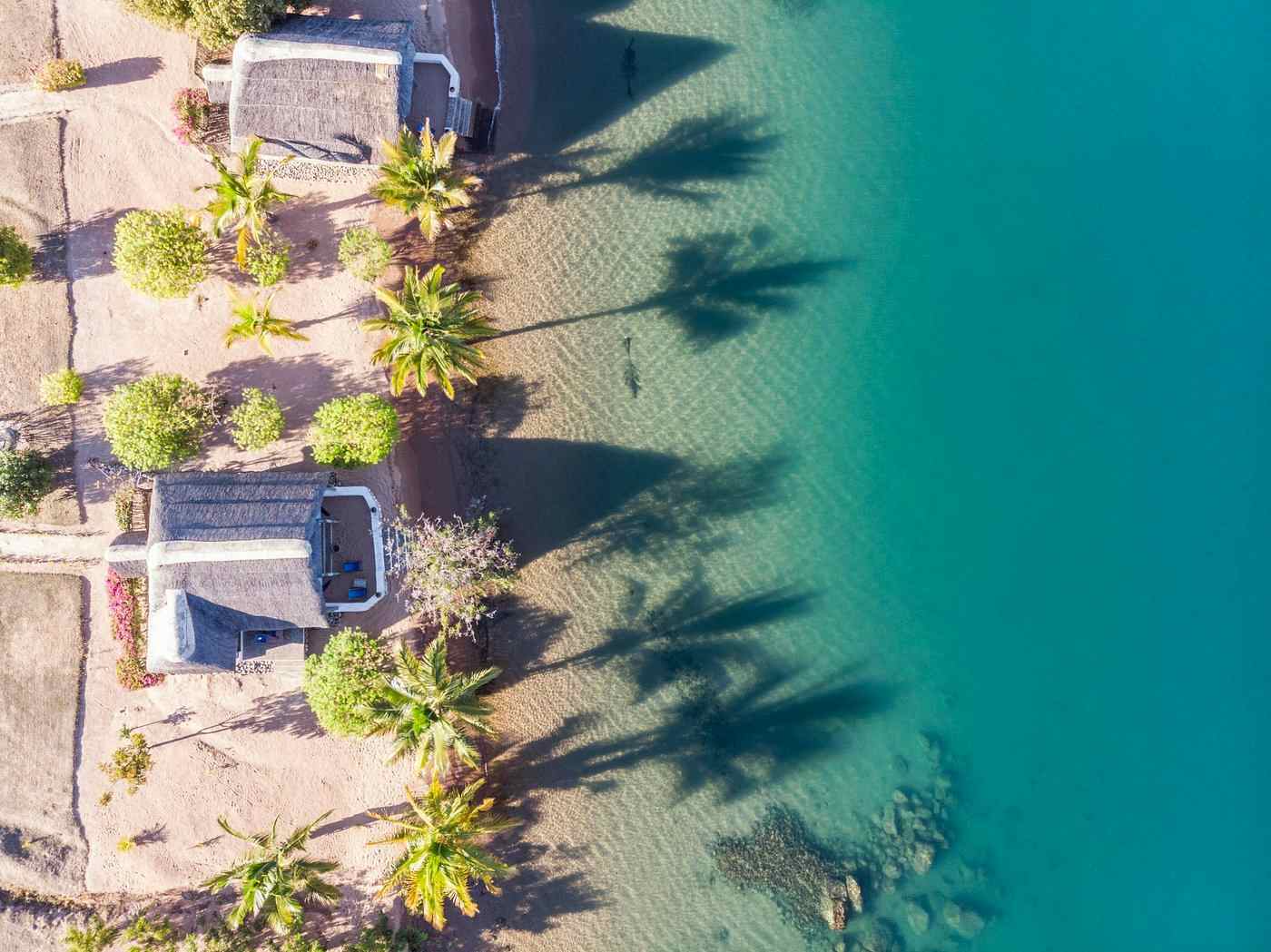
Driving
Rise very early for the transfer back to the airport to catch your 06:00 am flight to Mpanda. Your driver will meet you at the airport and drive you to Lake Shore Lodge. It is a beautiful four-hour drive that takes you through Katavi National Park and later the Lwafe Game and Forest Reserve, down the escarpment to Lake Tanganyika. Shared by four countries, Tanganyika is the world's longest freshwater lake, the second-largest lake in the world by volume, and the second-deepest. Settle into the lodge, enjoy a delicious lunch beside the lake and then have a relaxing afternoon enjoying your first swims and some hammock time after the long journey. In the evening, you'll have dinner under the stars and chat through the expedition to come.
Day 3
Expedition prep and lazy lake time
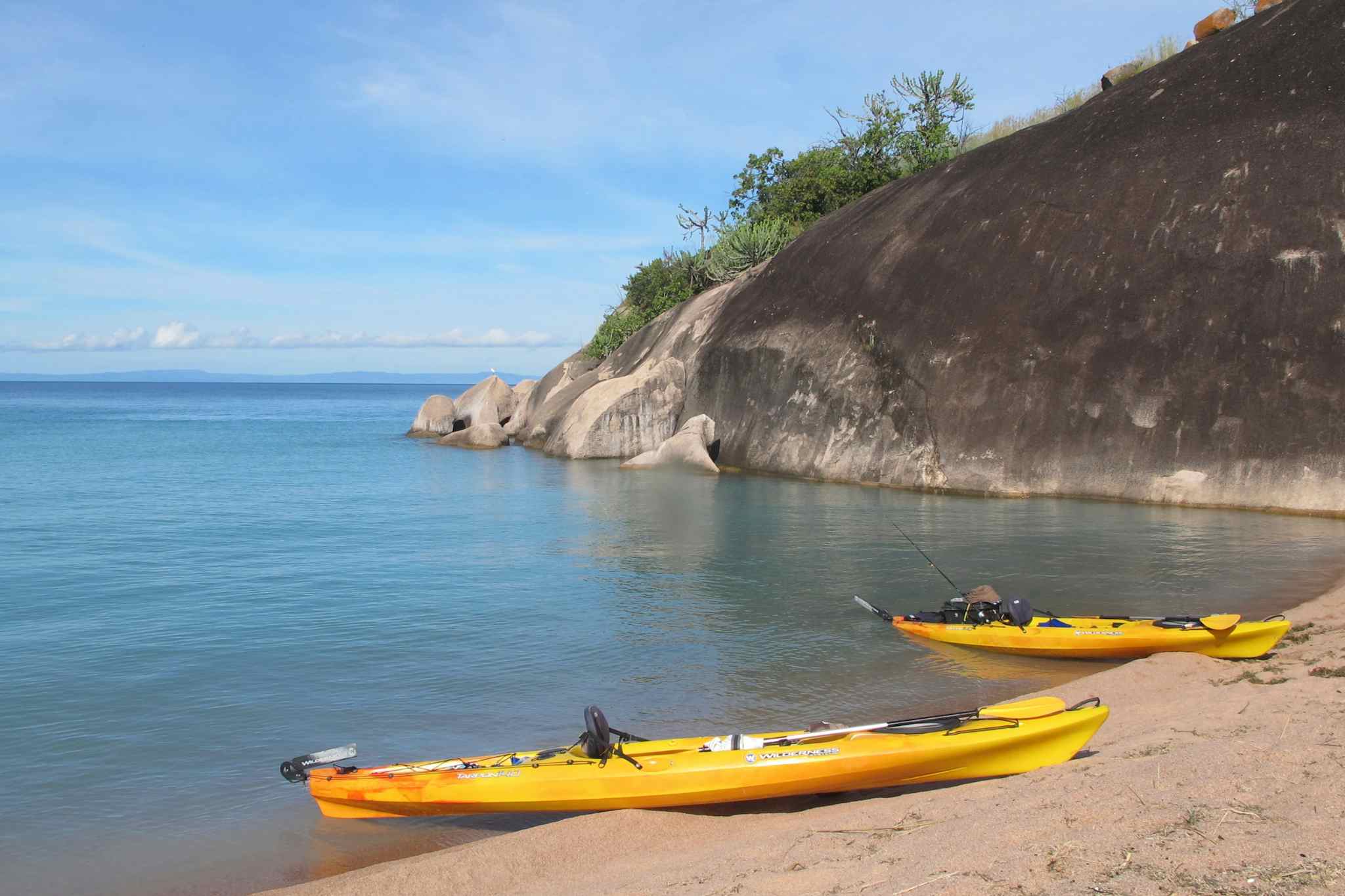
Kayaking
Waking up in this corner of paradise, grab a morning swim and some breakfast before its time to test out your kayak and pack for your adventure. Your guide will advise on best packing practice and you'll be free to head out on to the lake to get used to your kayak and to do a mini-exploration of the bays nearby. Enjoy some more downtime to soak this amazing place up – there are other activities that you can add on while you are here such as snorkelling, a sunset cruise, massages and small hikes, or you can simply lounge around, swim and laze in your hammock to charge your batteries ready for the expedition kick off tomorrow.
Day 4
The expedition begins
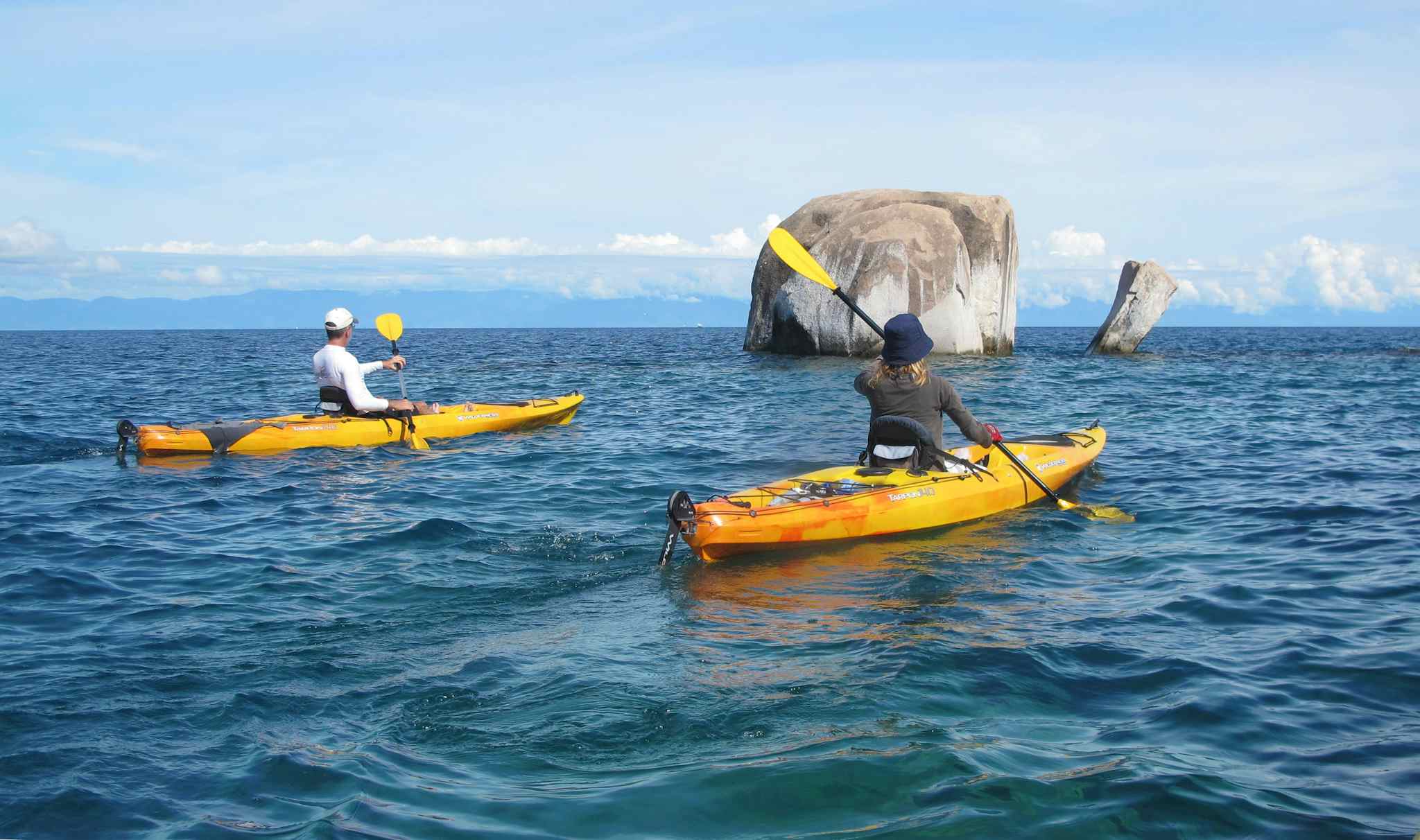
Kayaking
Your guide will help you with final preparations and then you are off. You'll depart Lake Shore Lodge early in the morning and kayak to the beautiful bay of Korongwe. As you head north, you'll encounter several fishing villages on the banks of the lake. It is a wonderful opening day, paddling past countless amazing beaches as you hug the shoreline. On the northern point there is a remote, secluded beach which makes for an ideal campsite. Dinner will be cooked all together over a fire, while sharing stories of the day's kayaking.
Day 5
Korongwe to Karema
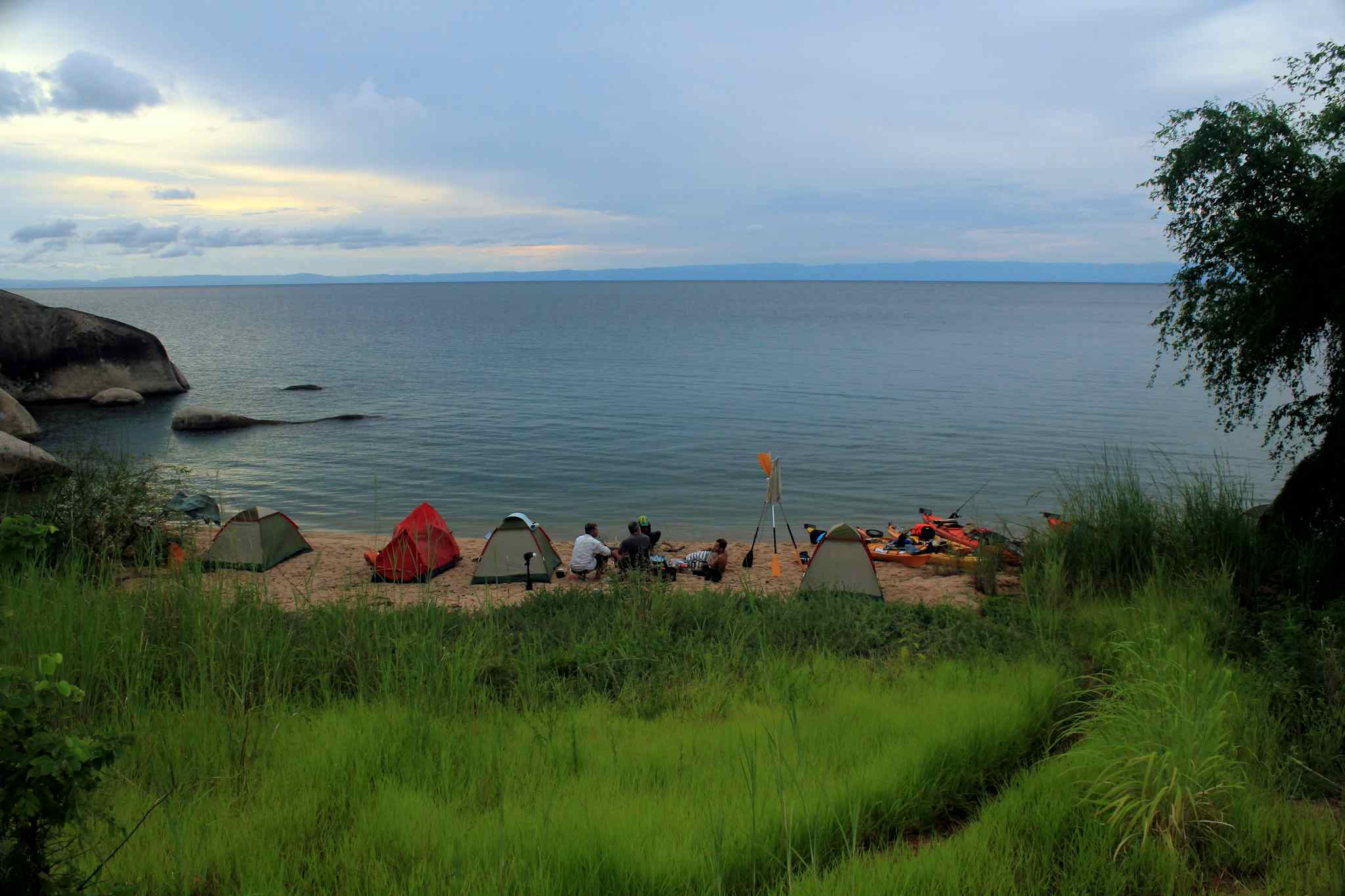
Kayaking
Wake up for the first time in your tent beside the lake, tuck into campside chapatis and maandasis for breakfast, then leave Korongwe, aiming for the southerly-facing beach just west of Karema. You'll kayak through the large sweeping bay in front of Kabwe village, flanked on the north side by the steep, well-forested mainland. The camping spot is nestled beneath the forest, the perfect setting for some afternoon downtime and swims in the lake before another dreamy night beneath the stars.
Day 6
Karema to Kalagunga
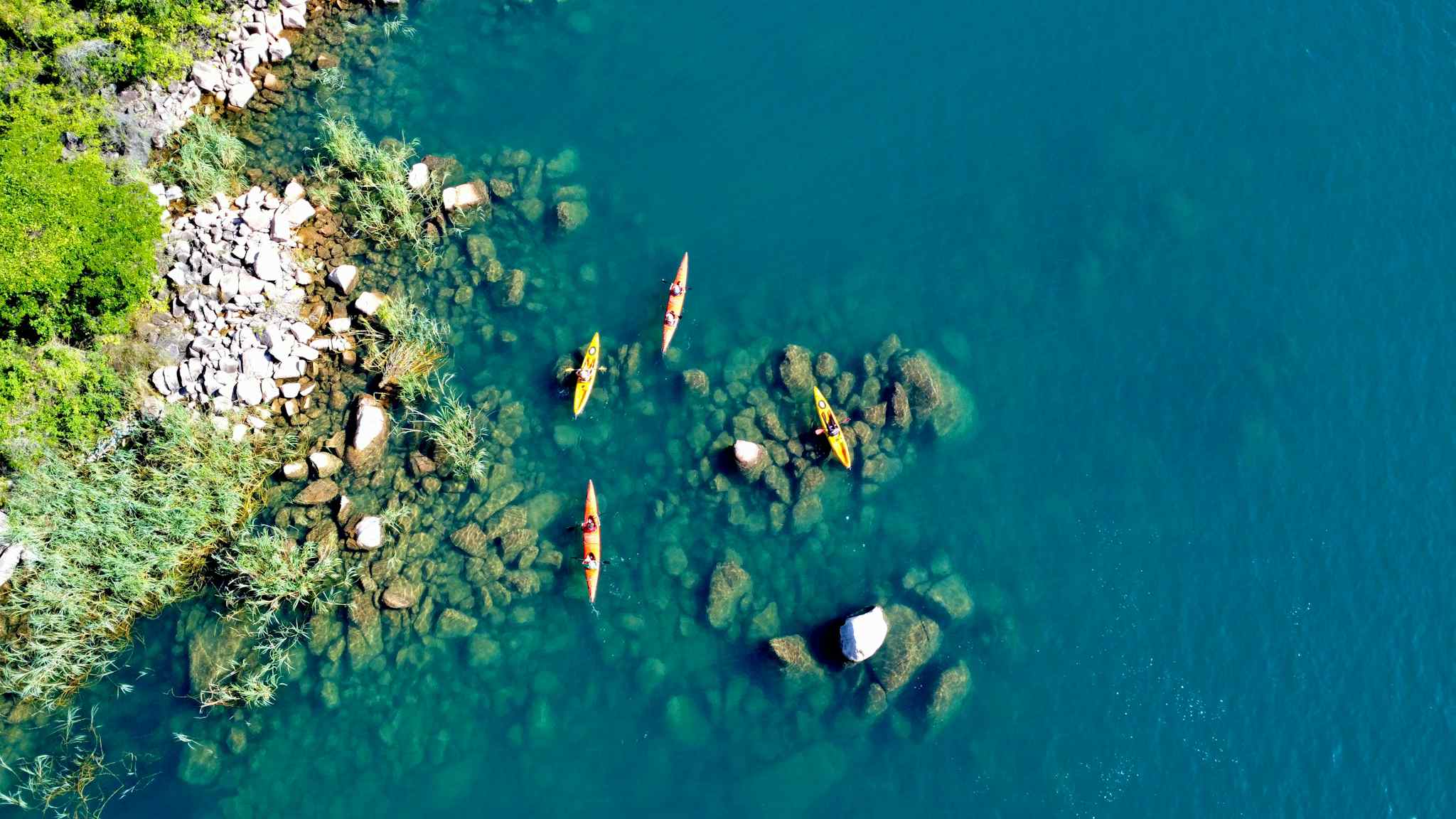
Kayaking
Settling into the rhythm of a true expedition, you'll pack down and set off early to make the most of the cooler part of the day. Paddle around the Karema point past Ikol, then along the heavily forested foothills of the Mahale mountain range which rises precipitously out of the water. Most of the lake's shoreline is quite rocky on this stretch, with fewer beaches. Each day after reaching camp, you can head out for short hikes to stretch your legs and explore the area. Tonight's camping spot is just north of Kalagunga, where your host will hopefully source some fish to roast on the fire tonight.
Day 7
Mahale National Park coming in to view
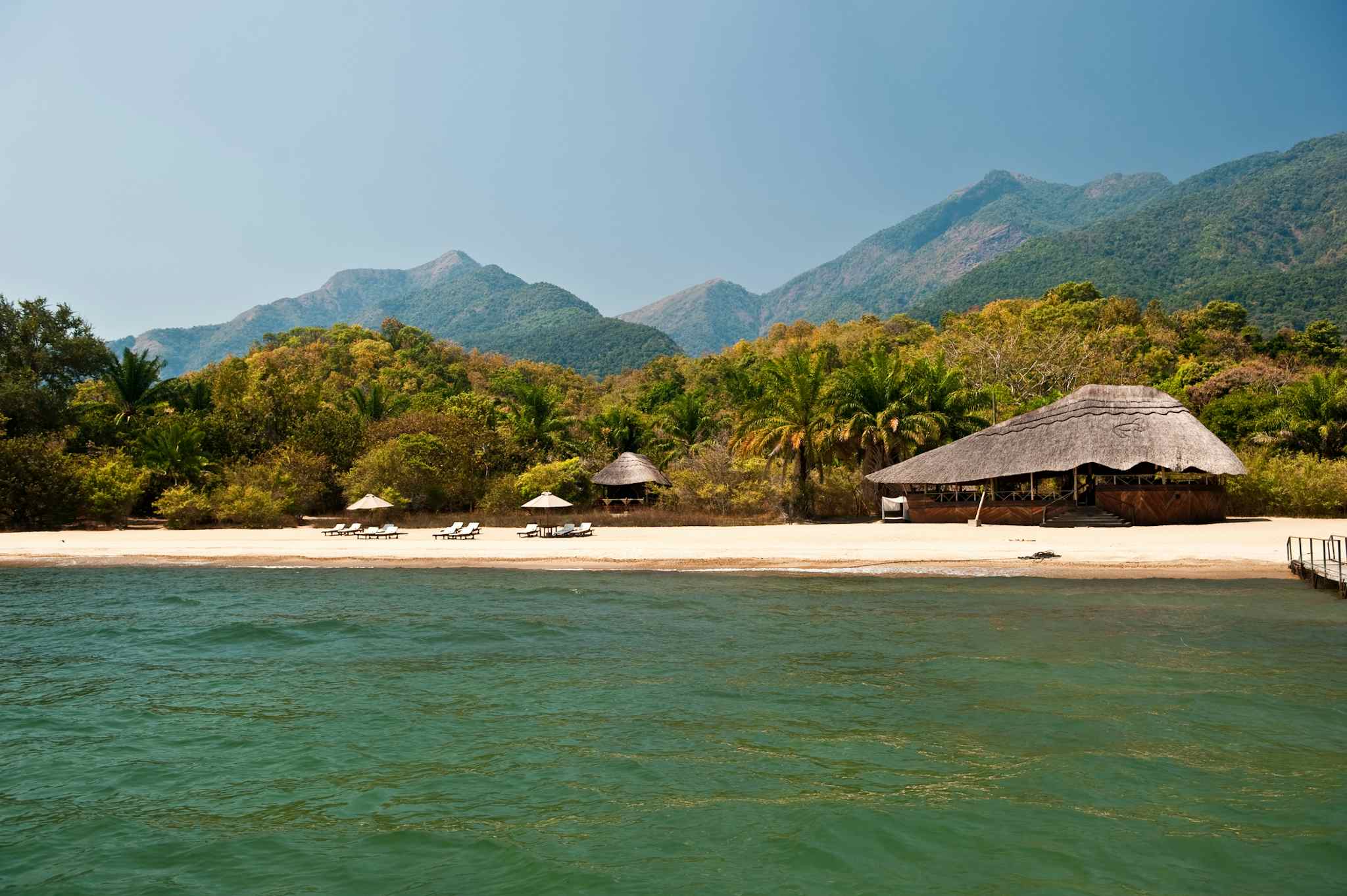
Kayaking
The scenery gets more and more dramatic the closer you get to Mahale Mountains National Park, particularly as you round the point of Sibwesa and start looking directly in to the park. The area becomes wilder and with that, your host advises the swimming fun is halted as this part of the lake does have crocodiles. You'll be perfectly safe from your kayak and while camping on the beaches, however, and any sightings are extremely exciting. You'll camp just shy of the park border with another day of otherworldly paddling under your belt.
Day 8
The final stretch to the heart of Mahale

Kayaking
Today will be the most memorable day of the expedition. Keep your binoculars close for quick draw, scanning the forests and the beaches for wildlife. In the tops of the trees, you might spot the Pel's Fishing Owl – a birder's dream. On the beaches, you might see waterbuck, otters, chimps and other primates, or even some lazy crocs warming in the sun. Today is the longest paddling day because you'll need to make it to the northern side of the park, to your final campsite. Look out for the amazing inlet towards the end of the day – one of the most exquisite areas on the planet – and a few kilometres on you will round the point and set eyes on the heart of the Mahale Mountains as you make your way to camp inside the park.
Day 9
Chimpanzee tracking
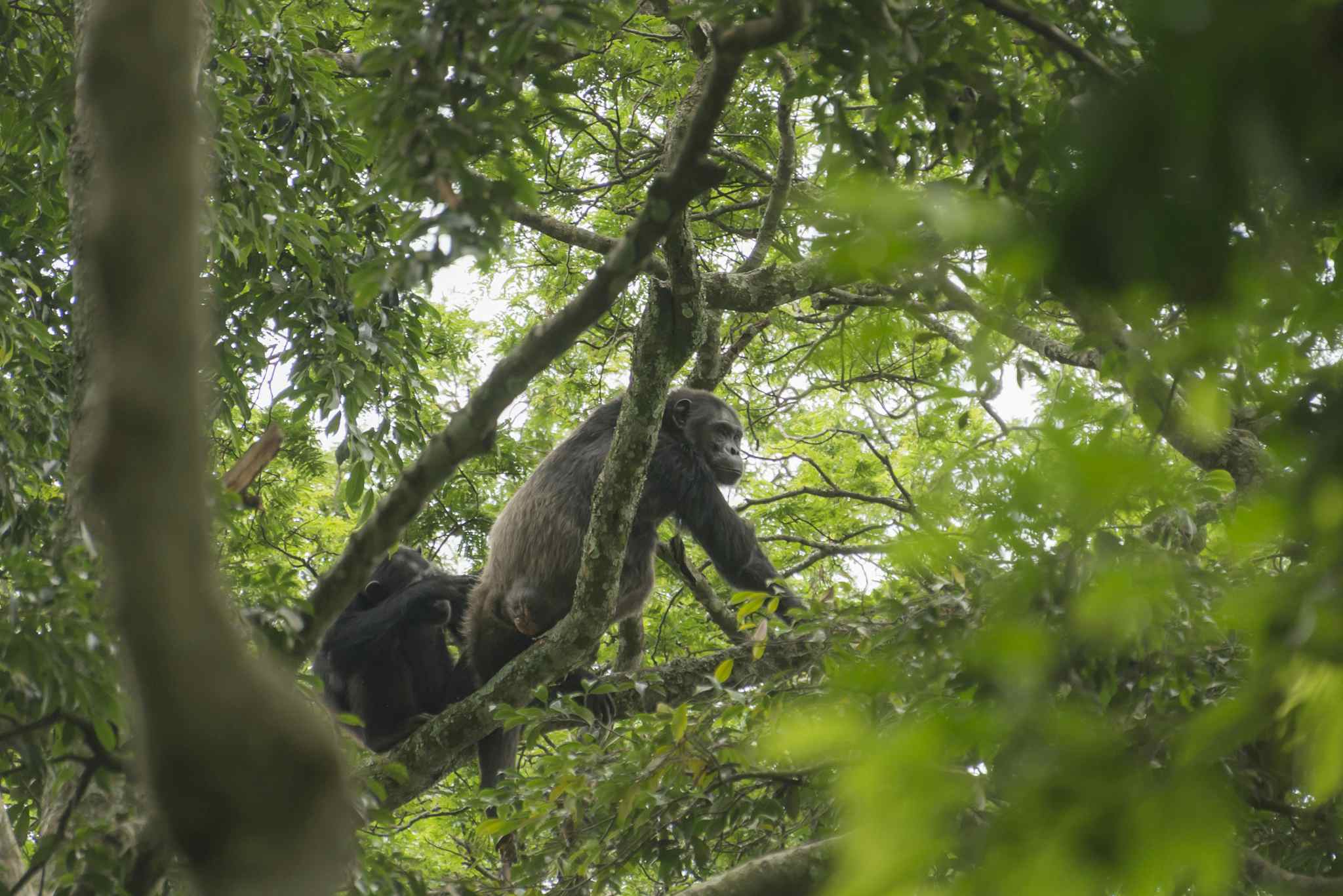
Hiking
Today is all about the chimps. You will head off into the Mahale Mountains National Park with a ranger to hike into the forest to look for the chimpanzees. Not only is the forest stunningly beautiful, but the first time you look into the eyes of a chimp will be a moment you will never forget. This is an incredibly rare opportunity to track chimpanzees in a lesser-visited part of Africa, guided by rangers and directly contributing to the protection of these incredible animals. You can spend one hour with the chimps, then you will head back for a last evening camping in Mahale.
Day 10
The finish line: back to civilisation
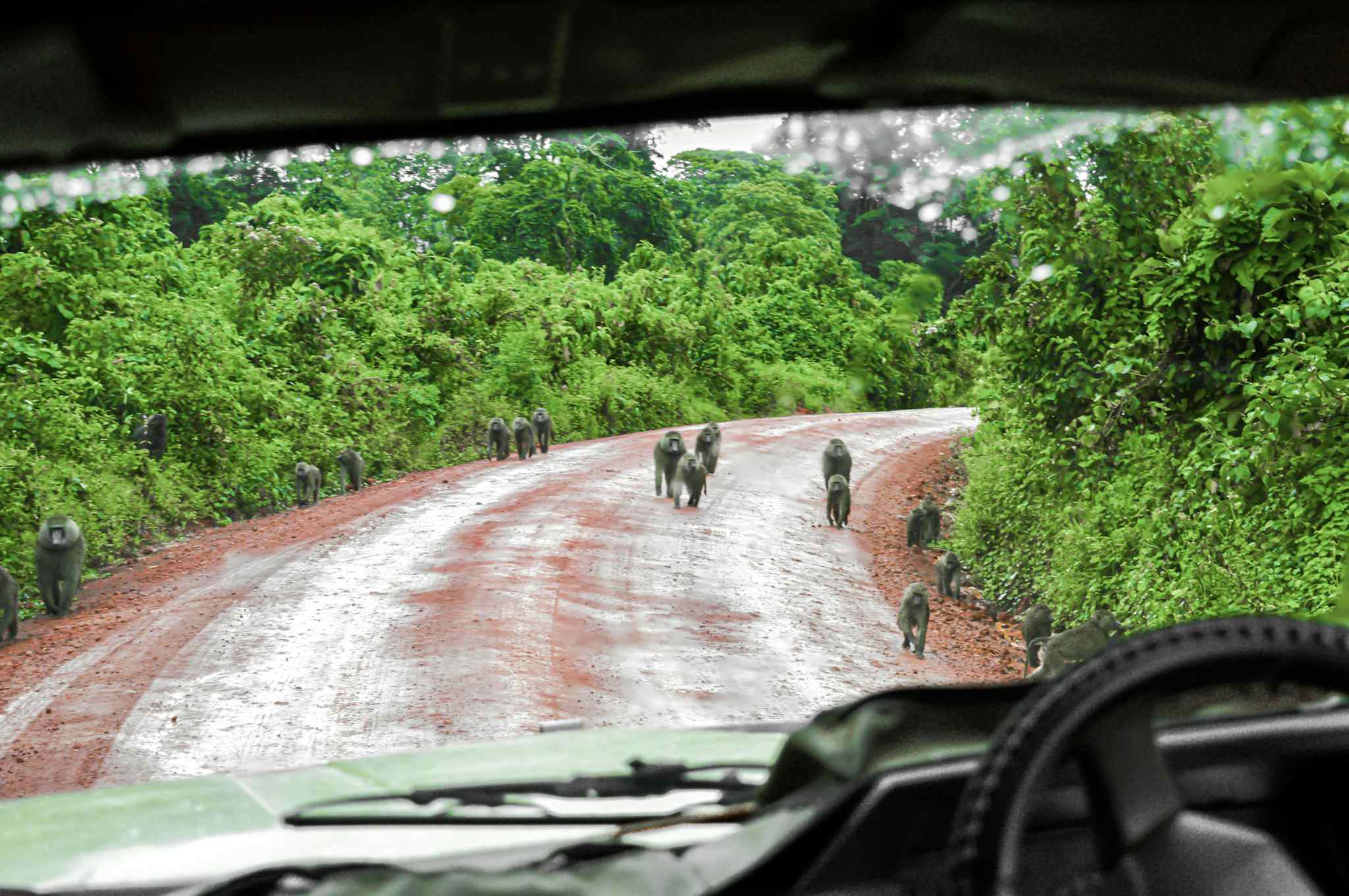
Kayaking
Wake up in this magical place one last time, pack up camp and do a shorter paddle to the Mahale airstrip, to the north of the National Park Headquarters. Say goodbye to your trusty kayaks that you have powered from the lodge to Mahale over the past week. Vehicles will be there to collect you and drive you to Kigoma, where you will spend the night at the Kigoma Hilltop Hotel. This is a cracking spot for a celebratory beer on the terrace, overlooking the lake to toast a once-in-a-lifetime expedition.
Day 11
Fly back to Dar es Salaam
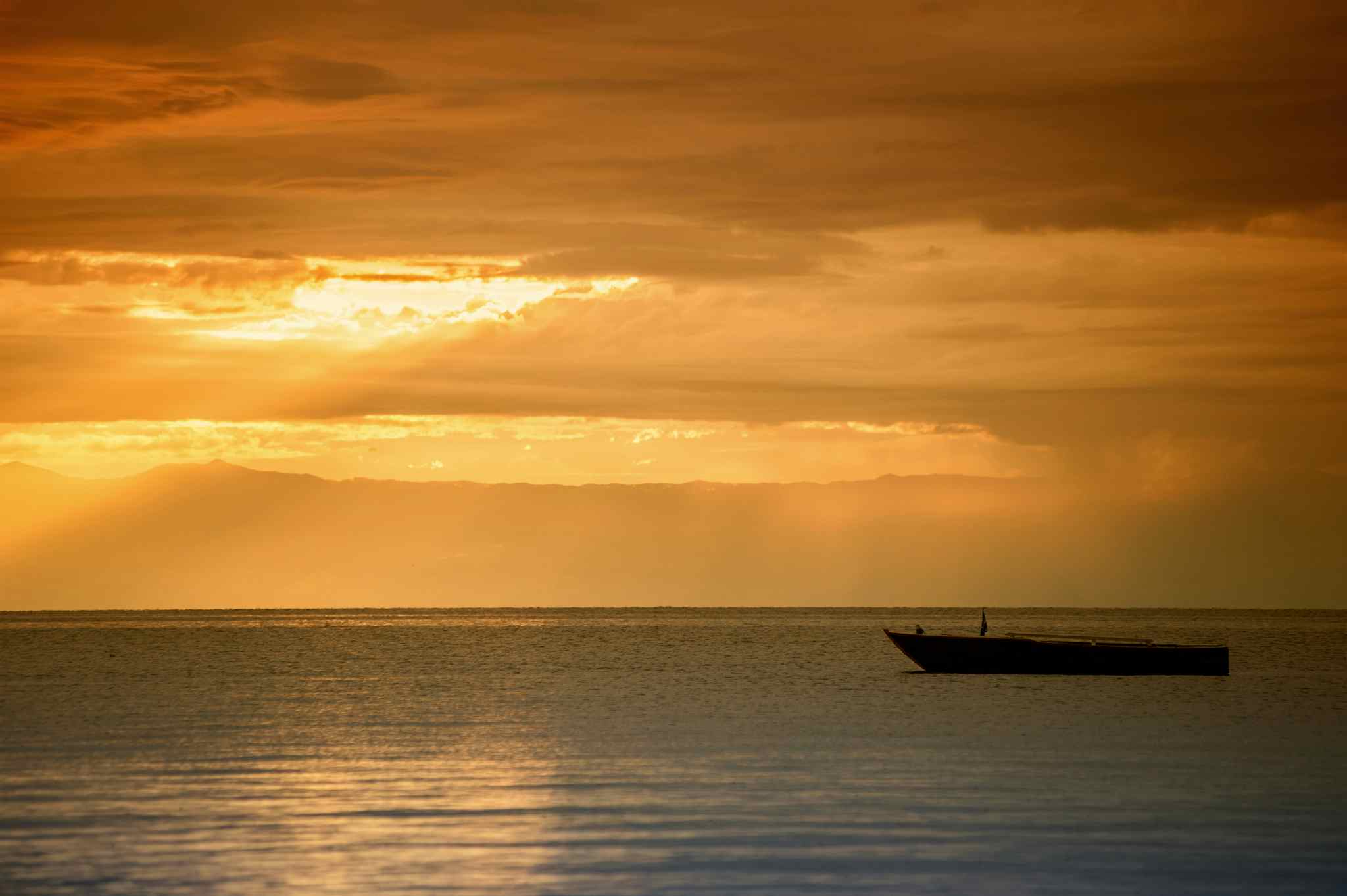
Catch one last farewell glimpse of the lake as you check out of the hotel and head to Kigoma Airport, in time for the morning flight with Air Tanzania to swoop you back to Dar es Salaam where your adventure comes to an end. You are free to catch any onward flight from 15:00 (to allow for any delays with the domestic return flight).
The Area
Logistics
Starts
Julius Nyerere International Airport, Dar es Salaam
Anytime on Day 1
Ends
Julius Nyerere International Airport, Dar es Salaam
10:30 on Day 11
Transfers
On Day 1 you'll be met and collected at Julius Nyerere International Airport, Dar es Salaam and transferred to your hotel for the night a short way away in downtown Dar es Salaam. On Day 11, your host will bid you farewell at Kigoma Airport at the end of the expedition, after which you'll take the domestic flight back to Dar es Salaam, arriving at 10:30. We suggest you book any onward international flights that depart after 15:00, to allow for any delays to the domestic flight.
Travel options
There are direct flights into Julius Nyerere International Airport in Dar es Salaam from many major hubs such as Paris, Amsterdam, Dubai, Guangzhou and Johannesburg. Travellers from the UK and North America will transit through any one of these hubs to reach Dar es Salaam.
Day 1
Breakfast
Lunch
Dinner
Day 2
Breakfast
Lunch
Dinner
Day 3
Breakfast
Lunch
Dinner
Day 4 – Day 7
Breakfast
Lunch
Dinner
Day 8 – Day 10
Breakfast
Lunch
Dinner
Day 11
Breakfast
Lunch
Dinner
What is the food like?
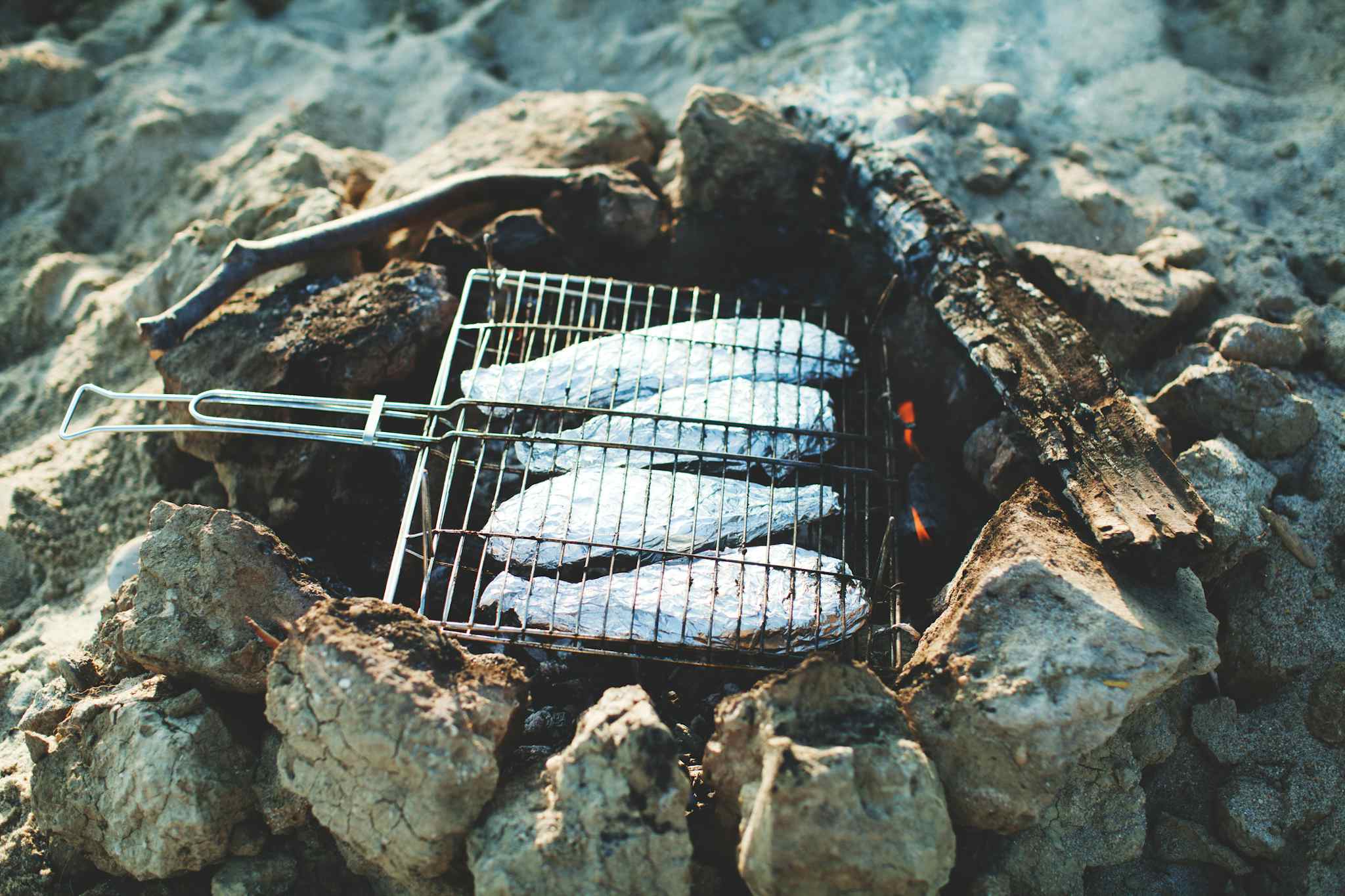
During your two days at Lake Shore Lodge, you'll pull up a chair at The Funky Mango Bar and Restaurant for local and international food, made using only the freshest ingredients from local farmers and from their organic herb garden. Meals are served at the edge of the lake under the stars, or in the main restaurant. The menu each day is a set menu, designed around the dietary requirements of everyone in the group.
During the expedition your guide will lead your group into villages that you pass, to pick up meals and resupplies. This gives the villagers a much-needed opportunity to make some money from the rare tourists who pass through this area. Breakfasts will generally be chapatis (a large, savoury pancake) and maandasis (a type of fried bread, like a doughnut) both cooked on an open fire, with eggs and tea. Lunches from larger villages will be cooked rice with either beans, fish or sometimes chicken. Watch out for chips maayai and never pass up the opportunity to taste one: it is effectively a chip omelette, sometimes with onion and tomatoes mixed in. It is served with salt on the side and a bottle of tomato sauce or fresh chilli and can be had for breakfast, lunch, dinner – or all three. Dinner will be similar to lunch, but your host will ensure some fresh fish is added to the menu. You will be constantly passing local fishermen in their homemade wooden boats and your guide will know which of these guys are fishing ethically and will negotiate the purchase of the catch of the day, to throw on the fire at night. Your guide will teach you some basic Swahili and a good amount of negotiation and banter is always involved – loads of fun is had experiencing this while out on the lake.
Vegetarians, vegans and other dietary requirements and allergies can be catered for – please just request this on your passenger info form.
What is the accommodation like?
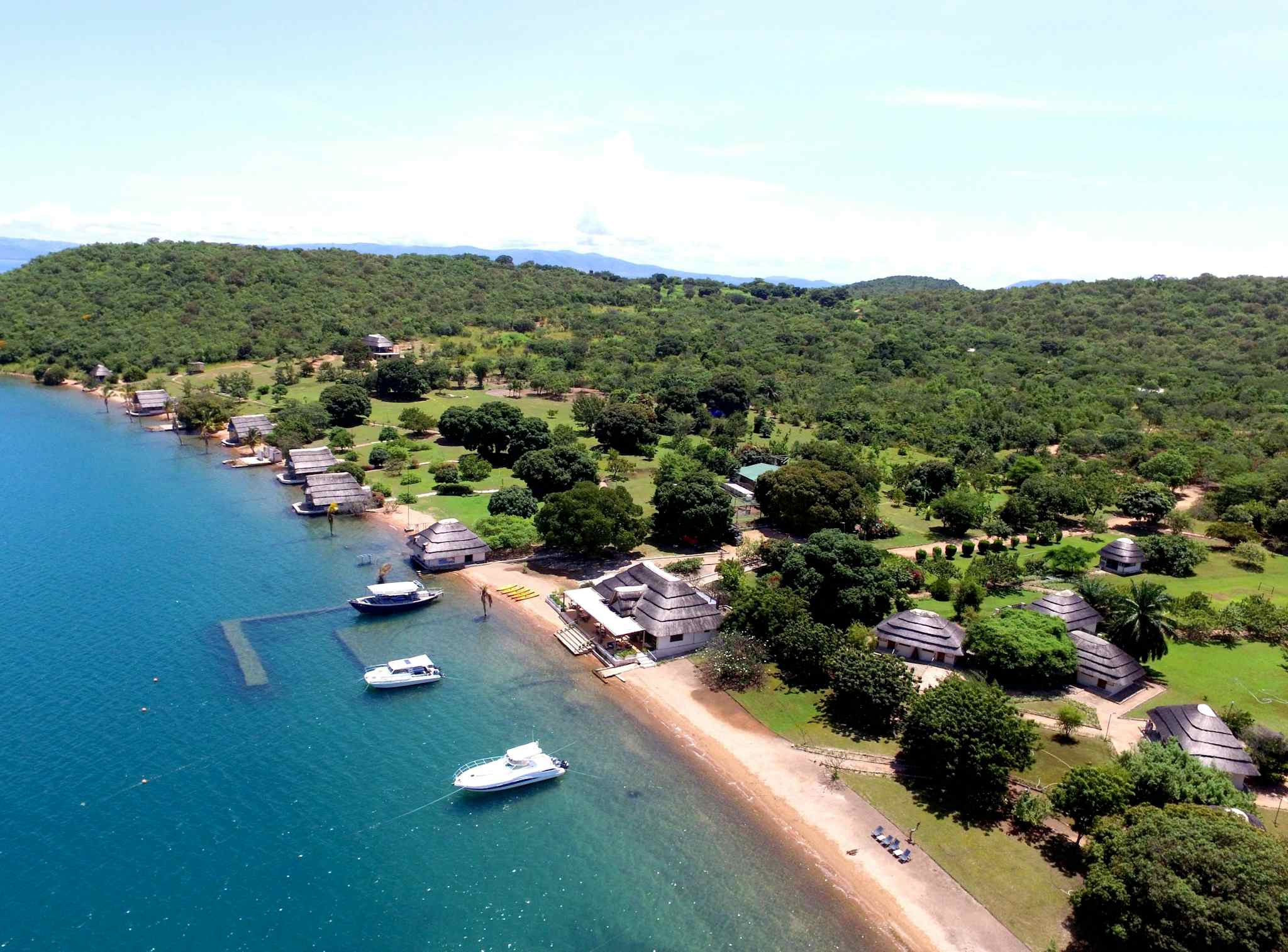
Lake Shore Lodge
You'll kick start your time on the lake with two nights at the stunning Lake Shore Lodge, run by a friendly team who also happen to be your hosts for the kayak expedition to Mahale. You will be staying in one of the bandas. These rooms have shared bathrooms just behind each banda, and lovely views of Lake Tanganyika.
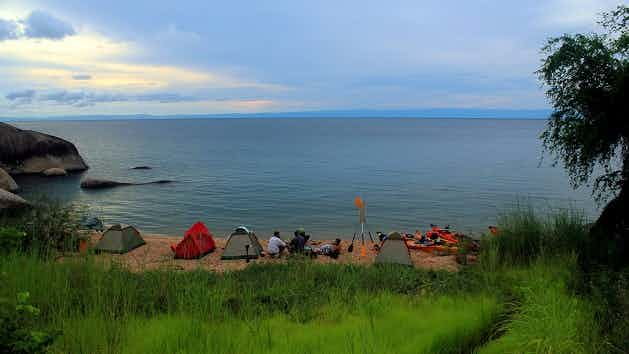
Camping
You'll spend seven nights camping along the shores of Lake Tanganyika and at campsites within Mahale National Park. This is a truly unique experience in some of the most remote and least-visited parts of East Africa. You'll be bunking down each night in twin-share expedition tents – you will need to bring your own sleeping bag, mat and pillow – see the Kitlist for more details. By law, travellers are not allowed to bathe in the lake, so your host will set up a basic shower booth and a separate toilet booth at each camp spot. The campsites in Mahale will have toilet facilities.
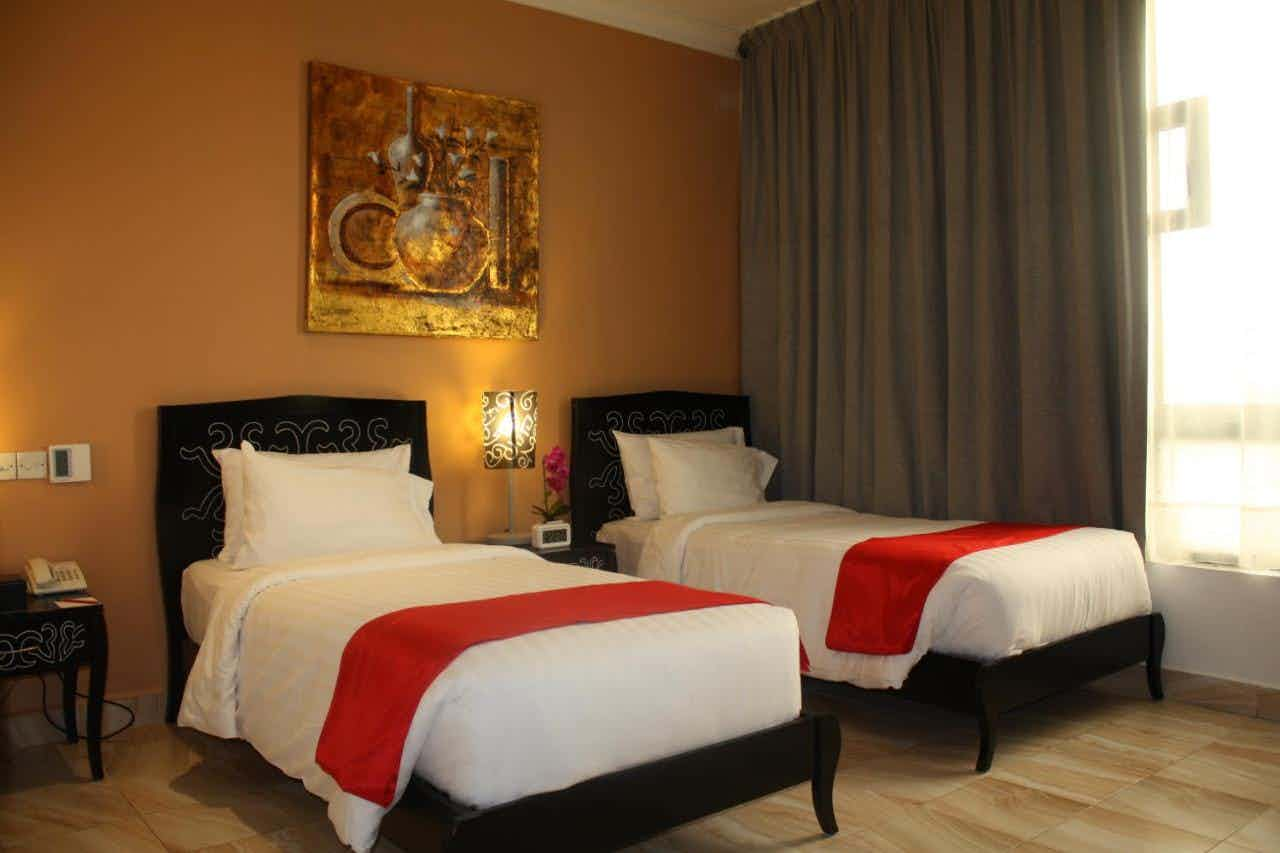
Dar es Salaam
Your first night on arrival in Tanzania is spent at the CBD hotel, a short drive from the airport. You'll stay in your own room with an ensuite bathroom.
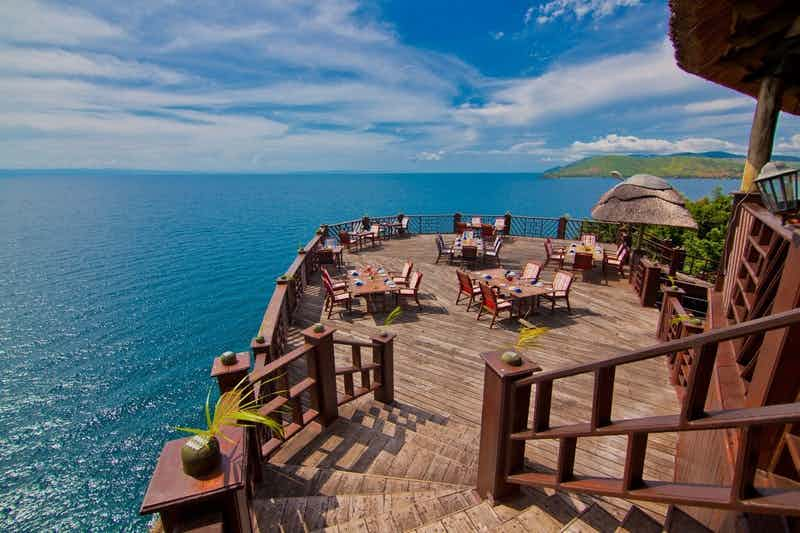
Kigoma
The final night of your adventure is spent at the Kigoma Hilltop Hotel in a stunning spot overlooking the lake, perfect for a celebratory end to the expedition with sundowners on the terrace and some dinner from the excellent restaurant. You'll stay in twin-share rooms with ensuite bathrooms.
Upgrades
For solo travellers looking for their own space, an optional private room and tent can be booked for an extra charge, see Optional Extras for the price. Please request this at the time of booking (this is subject to availability).
This trip has been rated as Challenging
This is an active and physical expedition, so participants should be in good health and reasonably fit to get the most out of the trip. Previous paddling experience is not essential, however, a couple of hours in a kayak getting to get the hand of basic paddle strokes before the expedition is advisable. On some days, wind could make the water a little choppy. Walking and chimp trekking in Mahale can be tiring – some trails are steep and long. During the five-day kayaking section of this trip the campsites are very simple and rustic. The expedition is easily achievable for most relatively fit people, although a generally high fitness level will help you enjoy the trip to its fullest. Your host finds that irrespective of distance and fitness, you can work on a healthy average of 6-7 km per hour on the kayaks. It is best to get away early and get 3-5 hours of paddling done before the heat of midday, then a stop for a meal/snack and some downtime.
What will I need to carry?
You'll need to take all of your gear with you on the kayak expedition, as you won't be returning back to Lake Shore Lodge after setting off.
Overall weather conditions – being on a kayak on the longest lake in the world, does place you firmly in the hands of the weather gods. On any day, the weather can be locally specific and could change several times during the day. There are only two prevailing winds, which depend on the season. During the dry season (May – November), the prevailing wind is from the south: this is good news, it will push you along. During the rainy season, the prevailing wind is from the north, so you'll be paddling against the wind slightly. The rainy season does not translate into rain every day, nor all day. Generally, if it does rain, there will be a strong windy period of about 45 minutes, an hour or two of rain, usually followed by utter calm. This is actually the best time to paddle your host's opinion, it is BIBLICAL!
The temperatures will never get below around 19-24° Celsius, even during the rainy season, and not normally above 30° Celsius, even during the heat of the day. Your hosts will never take a chance against the weather and your guide will never put a kayaker in jeopardy. If the conditions get unpleasant, you'll pull up on a beach, doze in a hammock, go for a swim or skim stones until the weather passes. Lost time for bad weather will be made up for during good weather periods.
We’re still waiting to collect any reviews from other travellers on this trip. However, all our hosts go through an extensive vetting process to ensure that your adventure is awesome.
Guides
Expert, expedition kayak guides, plus a park ranger guide in the Mahale Mountains National Park
Accommodation
1 night in a hotel, 2 nights in a lakeside lodge, 7 nights wild camping
Meals
8 breakfasts, 8 lunches, 8 dinners
Transfers
Airport transfers and everything in between
Equipment
All your kayaking and camping gear
Permits
Park fees and chimp trekking fees in Mahale
Our trips are hassle-free by design. We include all the activities and equipment, as well as many of the meals, so you can simply rock up with your rucksack and share the adventure with your new pals.
Personal Expenses
You know your own spending habits best, so please budget an appropriate amount for things like optional meals and drinks, shopping, optional activities, and laundry.
What's included?
- Single and tandem kayaks
- PFDs (safety jackets)
- Expedition tents and mats
- Snorkelling gear
What do I need to bring?
BAGS
- Soft overnight duffel bag or rucksack
- Drybags, 2 or 3 of varying sizes for personal items on the water
- Good quality, smaller ziplock bags
- One main bag - you are permitted one piece of checked luggage (max. 23kg) on the internal flights
CLOTHES
- Lightweight, packable waterproof jacket
- Lightweight, packable waterproof trousers
- Lightweight fleece jacket or similar
- A broad-rimmed sunhat
- Buff or neckscarf
- Long sleeved, lightweight, fast-drying shirts
- Lightweight trousers/shorts/skirts
- T-shirts
- Underwear and socks
- Swimwear
- Sunglasses with strap
- Sleepwear
- Hiking boots (worn-in) - trail runners are good as they are smaller for packing into the kayaks
- Sandals for around camp
- River shoes/old trainers for kayaking
SLEEPING
- Cotton or silk sleeping bag liner
- Lightweight pack-down sleeping bag (2 season)
- Travel pillow
- Thermarest or sleeping mat, again must be lightweight
OTHER
- Universal travel plug adapter
- Power bank or solar charger
- Passports (and visas)
- Travel insurance documents
- Ear plugs
- Insect repellent
- Suncream
- Personal first-aid kit (inc. blister treatment)
- Personal items (biodegradable toiletries, sanitary wear etc)
- Toilet kit (toilet paper, biodegradable bags to carry paper out to dispose of)
- Quick-dry towel
- Alcohol hand-gel
- Headtorch or torch
- Reusable water bottle x1 litre (or x2)
- Biodegradable wet-wipes
- Energy bars and snacks - read our article on Best Hiking Snacks
- Water purification tablets/treatment system
Optional Private Room & Tent Upgrade
Payable Before Departure
Optional Private Room & Tent Upgrade
…
We partner with the World Land Trust to ensure this trip achieves Net-Zero emissions. We also support their Buy an Acre programme, helping local communities to buy and protect natural habitats in perpetuity.
What's the number?
It works out on average at 340kg of CO2 emissions per person, including all local transport, accommodation, food, activities, guides, staff and office operations.
The only thing it doesn’t include right now is flights and travel to the destination. We do make an overall estimate across all our customers separately, but as we don’t book flights, have customers from all corners of the world, and no way of reliably knowing their travel plans, we simply can’t include an individual number in the figure on display here. We’ve got a goal to fix that, so that when you book, there is a way to measure and mitigate the carbon emitted by your flight too.
But what does the number mean?
Yep, hard to picture eh? To give you an idea:
- Driving 1000 miles/1609km would be approximately 281kg of CO2 in an average car (or 140.5kg per person, if there were two of you in it).
- A return economy class flight between London and New York would be approximately 1619kg (1.66 tonnes) per person.
- 10 trees in a temperate forest are estimated to remove approximately 250kg of CO2 from the air in a period of 5-10 years.
What are we doing about it?
Our trips are relatively low-carbon by design, and we're working with all our hosts to develop long term carbon reduction plans. We partner with the World Land Trust to ensure this trip achieves Net-Zero emissions. We also support their Buy an Acre programme, helping local communities to buy and protect natural habitats in perpetuity, ensuring the protection of the reserve and its wildlife.
Want to know more?
Amazingly, no international travel company has ever publicly published their carbon measurements before, as far as we know. We believe that must change, quickly. So we’re openly sharing the method we used in the hope that other companies will be able to more easily follow suit and build on what we've done so far. You'll find it all here.
Yes; there are crocodiles in the lake. However, your hosts have been diving, swimming and snorkelling in the lake during the daytime for 17 years and have never seen a crocodile by day, except around Mahale which is the only part of the lake that your host will advise against swimming on the expedition. You will certainly be safe on your kayak throughout the trip, and while swimming in parts of the lake outside of Mahale. Outside of wading into the water at dusk or dawn, in the same place repetitively for months and months, you should be 99.9% safe. Your guide will also always advise you on safe practice throughout the expedition. There are also hippos in the lake. These wonderful creatures wallow in shallow water, generally at river mouths. Since river mouths eject sandy water into the otherwise crystal clear water of the lake, these aren't the spots that your host will recommend for a swim. If you are lucky enough to see hippos, you will probably hear them first. Give them a wide berth and things will be fine.
Mahale Mountains National Park, despite being lesser known than the likes of the Serengeti and Kruger, is truly one of Africa’s greatest national parks, famous for the habituated chimpanzees that call Mahale home. The park offers an incredibly diverse and unique experience for the intrepid adventurer. Mahale boasts a pristine shoreline with white sandy beaches along Lake Tanganyika, rugged mountains, deep green jungles, waterfalls, woodlands and savannas. The highlight of exploring Mahale is undoubtedly the opportunity to spend time with the incredible chimpanzee groups that roam the park. These chimps have been the subject of a research project that started in 1965 giving insight into their behaviour, community and history. Mahale also supports nine other species of primates, making it one of the most important protected areas in Tanzania for primate conservation. In addition, the park supports wonderful butterfly diversity, fantastic forests and rewarding birding opportunities.
Situated in the west of Tanzania, within the Albertine Rift, this incredible lake is the second-deepest and second-oldest in the world. One of Africa's 'Great Lakes', it supports an incredible diversity of fish with more than 350 species, of which most are endemic, including the celebrated Tanganyika cichlids. The water in the lake is beautifully clear offering great opportunities for snorkelling and swimming. Numerous small fishing villages dot the shore in some areas, whilst incredibly remote and inaccessible beaches offer idyllic camping sites in Mahale Mountains National Park. Lake Tanganyika is estimated to hold 18% of the world’s fresh standing water and it is also the longest lake in the world at 675km.
Tips are not included in the trip cost. These are entirely at your discretion but there is an expectation to tip for good service. Your guide will help with advice, however we suggest the below as a guideline per person:
$10 USD per day
Of course, you are free to tip more or less, and the amount should be reflective of your perception of service and quality - a tip is not compulsory and should only be given when you receive excellent service.
Your host hates plastic bottles, and since this trip involves you self-propelling over 18% of the world’s fresh water, your host utilises this source to its fullest. Every paddler needs to bring their own water treatment tablets or a portable water purifier, as well as a couple of storage bottles that can be filled every morning or as necessary. Please read our article on the best water filters for adventures. Your host will provide filtered water on the expedition, but it's best to bring your own to fill up and filter as you go.
One checked bag of up to a maximum of 23kg is included for the internal flights on this trip. You can store any excess luggage at the CBD Hotel in Dar es Salaam for a small fee.
On the expedition, if there is a problem due to bad weather and the group are not able to complete the full distance, your guide will call in a boat using a satellite phone. The boat will come up to Mahale early, pick up the group and the kayaks and take everyone into Mahale for that section of the trip. To travel on from Mahale (which will be done by kayak if the weather is fine), your host will use the Tanzania National Parks boat to take everyone where the vehicle will collect them to drive them to Kigoma.
If flight cancellations from Dar es Salaam to Mpanda affect the itinerary, your host will pivot the group to an alternative flight to Mbeya, then travelling by vehicle Mbeya to Lake Shore Lodge. This involves a longer journey, so you'd arrive at the lodge by evening in this instance (as opposed to lunchtime if you travel through Mpanda). If the flight from Kigoma to Dar es Salaam is cancelled, your host will take the group to Mpanda for the return flight instead. This would involve an overnight in Mpanda rather than Kigoma.
Your host uses a mix of single and double sea kayaks. The Wilderness System Tarpon 140 Single Kayaks are very stable machines, equipped with rudders which are essential for longer trips. They are comfortable and have good stowage capacity. The Wilderness System Northstar Tandem Kayaks, also with rudders, are brilliant long-distance tandem kayaks, also offering great stowage capabilities. Your host will distribute your group in the kayaks depending on the group dynamic, along with any preference you might have for being in a single or double.
Single kayak: 375lbs/170kg Tandem kayak: 600lbs/272kg
Sure can! Over 70% of our travellers travel solo, it’s a great way to meet like-minded people.
Our team of Adventure Hunters co-create exclusive adventures which are run by highly vetted, specialist hosts. The trip is run by our trusted host partner in the destination. We only work with independent, local, in-destination experts who know the very best places to explore and how to stay safe. Read more information about the local teams we partner with. You’ll be introduced to the host straight after making a booking via the Much Better Adventures platform.
Much Better Adventures refer to the UK Government’s official travel advice when designing trips and monitoring trip operations. We recommend that all customers are familiar with the practical information provided on the Government’s FCDO website, where current travel advice can be found by searching for the applicable destination(s).
For customers joining this trip from other international destinations – please also read the official travel advice applicable to your country of residence/origin, as this may differ.
We recommend checking out the country-specific information and also talking to a travel nurse.
We automatically convert prices from the local currency that a host receives to your chosen currency. We update our exchange rates on a daily basis so this does mean that prices displayed on the site are subject to currency fluctuations, which is why you may see them change over time.
If you wish to change the currency you pay in, head to the bottom of the page.
All of our group adventures are specially designed for adults to enjoy as we want these adventures to bring together outdoorsy people who are truly like-minded. You must be over 18 to join one of our trips.
You're always in good company on one of our adventures.
Our trips are typically made up of a mixture of solo travellers and small groups of 2 or 3 friends, with most in their 30s-50s.
Our sociable adventures are solo-friendly by design and naturally attract outdoorsy people with a shared mindset; a love for adventure, a desire to push themselves and meet awesome, like-minded people along the way.
It’s this camaraderie that has so often turned a great adventure into a life-changing one.
Don't just take our word for it:
- 95% of people rate the group dynamics on our trips 5/5
- 90% of people recommend joining a trip to make new friends
- 75% of people have met people on our trips that they would now consider friends
See here for more info about the Much Better Adventures tribe.
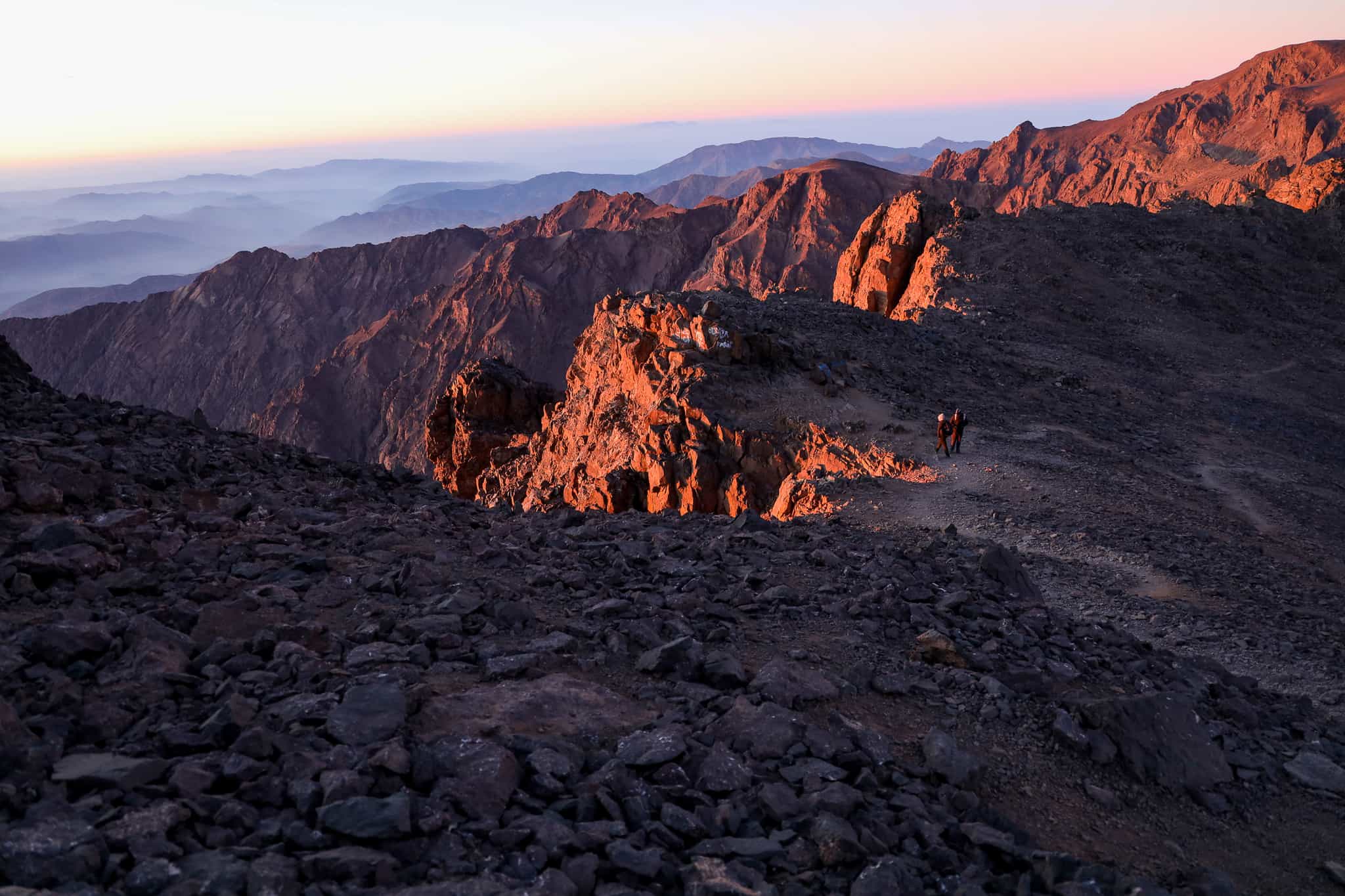
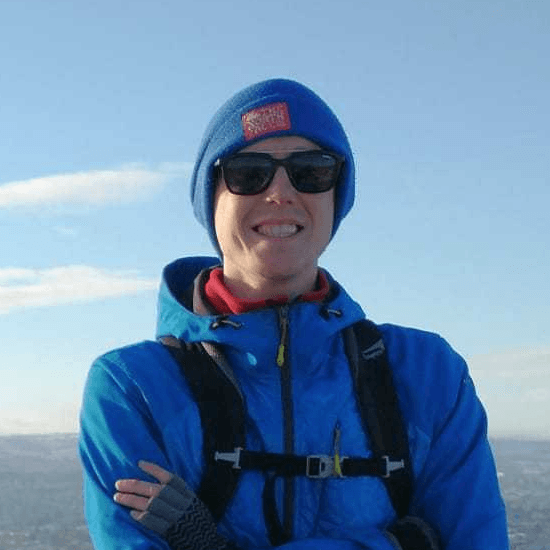
Need help finding flights?
From logistics and how to get there, to fitness, group dynamic and trip difficulty, Rory and his team of friendly experts are on hand to help.
We've got your back
Guaranteed to run
All Much Better Adventures trips are now guaranteed to run. Once you’ve booked your spot you can immediately make your travel arrangements, no uncertainty, no hanging about (excludes 'request to book' departures). Full details
Flexible payments
Secure your spot with the minimum deposit and pay off the remaining balance in as many instalments as you like, with no interest or fees. Full details
Happiness Guarantee
We’re so confident you’ll have an amazing time we’ll put our money on it. Full details
Full financial protection
To give you complete peace of mind Much Better Adventures is backed by ABTOT, ABTA and ATOL memberships. Full details
Tried & Trusted
Much Better Adventures is rated ‘Excellent’ on Trustpilot with over 1000 verified trip reviews averaging 4.8/5.
Connect before you go
You'll be invited to join a WhatsApp group to get to know each other before your big adventure together. Full details
DEPARTURE DATES
